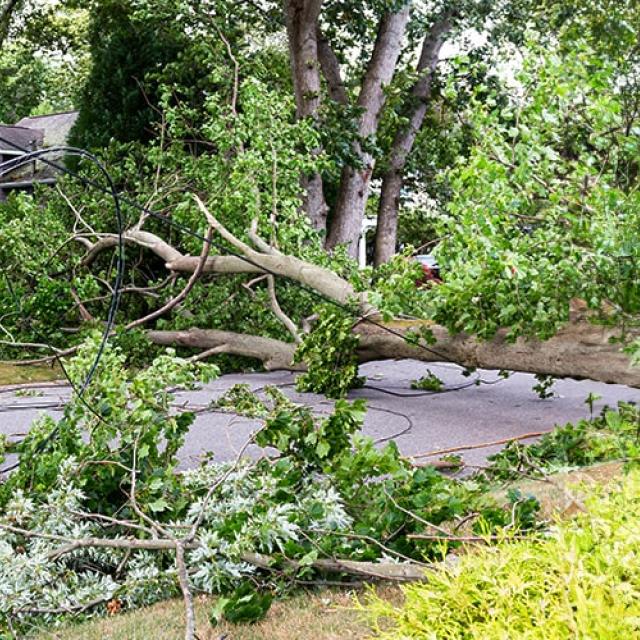High winds: How to get ready and protect yourself

High winds are becoming increasingly frequent in Québec and can occur at different times of the year. That’s why it’s essential to know how to get ready and take appropriate action when these weather events threaten your safety and property. Our specialists share a few prevention tips and important insurance information to ensure you’re as ready as possible to deal with any damage caused by high winds when these storms appear on the weather radar.
High-wind periods in Québec
In Québec, while high winds can occur throughout the year, fall and winter are when they are more frequent. These gusts are often due to sudden changes in temperature, atmospheric depressions, and localized weather events. The risks associated with these dangerous storms vary with the seasons, so it’s important to adjust your preparations regularly.
Fall and winter: High winds are most likely to occur in Québec from November through March. This period is often marked by sudden changes in temperature and winter storms. High winds associated with these conditions can cause problems such as power outages, falling trees, and property damage.
Spring: Although high winds are more common during the rest of the year, the transition from winter to summer is a time of abrupt temperature swings, which cause severe gusts.
Summer: During the hottest season of the year, extreme weather conditions can produce powerful winds, especially during thunderstorms. It’s also important to note that the hurricane season runs from June to November, and some hurricanes can travel as far as Québec and take the form of tropical storms.
Since weather events accompanied by high winds can occur at any time of the year in Québec, it’s essential to keep an eye on Government of Canada weather alerts and take appropriate preventive measures, whatever the season. Preparation and vigilance are key to dealing with these potentially dangerous conditions.
How to prepare for high winds
When a wind warning is issued for your area, it’s important to take steps to ensure the safety of you and your loved ones before conditions outside deteriorate. The Government of Québec recommends a few measures to deal with any eventuality in these circumstances.
- Prepare an emergency kit: Make sure you have an emergency kit on hand, including flashlights, spare batteries, a portable charger for your cellphone, blankets, canned food, water, essential medications, and anything else you might need during an extended power outage.
- Draw up a family emergency plan: This plan should contain all the resources you need to contact in the event of an emergency (e.g., contact information for family members willing to put you up, the number of the pharmacy to temporarily transfer prescriptions for essential medications, information from the school secretary to confirm your child is safe but will be absent), an evacuation route for your neighbourhood, a home evacuation plan, an inventory of your possessions, and any other information you need to ensure you’re safe in the event of an emergency or disaster.
- Stay informed: Check the weather forecast regularly on TV, on the radio, or online. Weather alerts will keep you informed of changing conditions.
- Postpone non-urgent travel: Avoid driving as much as possible. If you absolutely must travel, check the road conditions on the Québec 511 website or by calling 511 on your phone.
- Secure your property: Tie down or stow outdoor items that could be blown away, such as garden furniture, garbage cans, and seasonal decorations. Make sure doors and windows are securely closed—even in your garden shed!
- Shelter your car: If possible, park it in a garage or under a carport. If you have a temporary shelter, make sure it’s securely fastened to the ground. If you don’t have access to protected parking, park your vehicle away from trees, streetlights, and utility poles.
- Follow the authorities’ instructions: Follow the recommendations of local authorities and avoid going outside, except in the event of an emergency or evacuation. High winds can cause a number of hazards, such as falling trees and power lines, and collisions with objects swept away by a gust.
Safety tips for high-wind events
When there’s a high-wind event in your area, the priority is your safety and that of your loved ones. So make sure all your family members and pets stay indoors. Keep the doors and windows of your property closed.
If you’re driving, park your vehicle in a safe place away from trees and other structures that could fall on your car.
Tornado warning
Although tornadoes are rare in Québec, data from the Weather Network show that an average of 6.4 tornadoes occurred each year from 2000 to 2021. These phenomena usually occur in the summer, during heatwaves. If a tornado warning is issued for your area, follow these Government of Canada safety instructions:
- Find shelter: Look for a solid shelter, such as a cellar or basement. If this isn’t possible, head to an interior room in the centre of your home and take cover under a heavy table or desk, away from windows.
- If you’re outside, it’s best to lie down in a ditch and protect your head with your hands.
- If you’re driving and spot a tornado in the distance, find a solid shelter. However, if the tornado is close by, leave your vehicle and take cover in a low-lying area, such as a ditch.
- Stay as close to the ground as possible: Protect your head with your hands and watch out for flying debris.
- Do not chase a tornado: Do not go outside to observe a tornado up close, and stay indoors until the warning is lifted. A tornado is unpredictable and can change course abruptly.
Mixed conditions: Snow, freezing rain, and high winds
Québec is prone to unpredictable weather conditions with a mixture of snow, freezing rain, and high winds. When such a combination is anticipated, additional precautions are required.
- Avoid unnecessary travel: If possible, stay home and avoid driving. Road conditions can be hazardous in the event of freezing rain and high winds.
- Keep an emergency kit in your car: Make sure you have an emergency kit for your car, including blankets, warm clothing, a shovel, chains, food, and water. And don’t wait for the first snowfall to get your winter tires put on! That way, you’ll be ahead of the game when mixed winter conditions come.
- Prepare your home for the risk of a power outage: A widespread power outage may occur during a weather combination like this. Remember what to do in the event of a power outage, so you can prepare accordingly.
High winds, tornadoes, and storms: What to do afterwards
Once the weather event is over, it’s a good idea to inspect your home to ensure it’s still safe. If it has been damaged, follow these instructions from the Government of Québec:
- Never go into a building that has been damaged by wind.
- Check for damage by inspecting your roof, shed, pool, etc.
- Pick up debris and be careful when handling sharp fragments such as pieces of sheet metal or shards of glass.
- Never approach a downed power line. When a power line touches the ground, there’s a high risk that it’s live, causing electricity to flow through the ground around it. Call 911 immediately.
- Make a list of the damage and take photos and videos as proof. Notify your municipality and insurer of the damage. For claim purposes, keep all receipts and proofs of purchase for damaged property.
High winds and insurance: What’s covered?
In the event of damage caused by high winds, tornadoes, or extreme weather events, it’s important to understand what’s covered by your home and car insurance.
In general, most basic home insurance policies cover damage caused by high winds or tornadoes. You should nevertheless check the terms, limitations, and exclusions of your policy.
As far as car insurance is concerned, there are three types of coverage for windstorms: “comprehensive,” “all perils other than collision or upset,” and “specific perils.” This means that damage to your car caused by high winds, including collisions with flying or falling objects, is covered, provided you have chosen one of these coverages, and subject to the limitations and exclusions of your policy.
For more information on how home insurance applies in the event of high winds in Québec or to add coverage for this type of loss to your current car insurance, please contact one of our damage insurance representatives!



